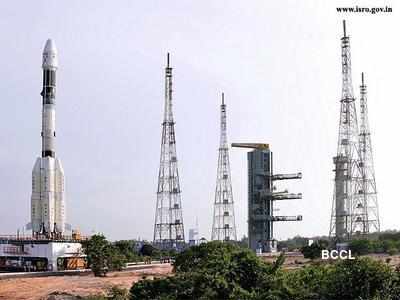- News
- India News
- Isro plans to scale up outsourcing, double satellite launches
Trending
This story is from November 8, 2017
Isro plans to scale up outsourcing, double satellite launches
With Indian Space Research Organisation (Isro) gearing up to resume satellite launch services from mid-December after a three-month lull, it is planning not only to double its launch frequency from next year but also to scale up outsourcing to the private sector.

PSLV-C37 launched the first Cartosat-2 series satellite along with 103 co-passenger satellites in a single flight. (File photo)
Key Highlights
- Indian Space Research Organisation is gearing up to resume satellite launch services from mid-December after a three-month lull.
- Plan includes not only to double its launch frequency from next year but also to scale up outsourcing to the private sector.
NEW DELHI: With Indian Space Research Organisation (Isro) gearing up to resume satellite launch services from mid-December after a three-month lull, it is planning not only to double its launch frequency from next year but also to scale up outsourcing to the private sector.
Currently, the space agency launches 9 to 10 spacecraft built by it every year. Dr K Sivan, director of Thiruvananthapuram-based Vikram Sarabhai Space Centre, said, "Isro is targeting to double the number of launches from 9-10 to 18-19 launches per year."
On outsourcing of jobs to the private industry, Isro chairman A S Kiran Kumar said the space agency does as much activity as possible with the industry."Wherever it's possible to get things done through the industry, we are doing and it will only increase in the coming days because we need to do more frequent activities," he told a news agency.
Dr Sivan said, "Currently, 80-90 per cent of work relating to launch vehicles are being done by the industry, including private and public sector companies. Only, critical components are manufactured by Isro. After we purchase 90 per cent of vehicle components, propellant casting and vehicle integration are done at the Sriharikota launch centre." He said, "The space agency currently focuses on vehicle integration, vehicle engineering, mission design (marking trajectory), launch and quality assurance."
The Isro chairman, too, said the space agency is looking at the possibility of building a PSLV in a joint venture with a set of industry partners by 2020-21. The role of industry in the making of satellites, however, is restricted to 30-35 per cent as the spacecraft is the key part of any space mission.
Isro is still coping with the launch failure of navigation satellite IRNSS-1H, which got stuck in the heat shield during its launch on August 31 this year. IRNSS-1H was meant to replace the country's first navigation satellite IRNSS-1A, whose three atomic clocks, meant to provide precise locational data, had stopped working last year. The lull in space activities for over three months after the unsuccessful launch of IRNSS-1H increased pressure on Isro to boost its space activities. From December onwards, Isro is going to launch a slew of satellites, including the high-profile Chandrayaan-2 mission in March 2018.
Currently, the space agency launches 9 to 10 spacecraft built by it every year. Dr K Sivan, director of Thiruvananthapuram-based Vikram Sarabhai Space Centre, said, "Isro is targeting to double the number of launches from 9-10 to 18-19 launches per year."
On outsourcing of jobs to the private industry, Isro chairman A S Kiran Kumar said the space agency does as much activity as possible with the industry."Wherever it's possible to get things done through the industry, we are doing and it will only increase in the coming days because we need to do more frequent activities," he told a news agency.
Dr Sivan said, "Currently, 80-90 per cent of work relating to launch vehicles are being done by the industry, including private and public sector companies. Only, critical components are manufactured by Isro. After we purchase 90 per cent of vehicle components, propellant casting and vehicle integration are done at the Sriharikota launch centre." He said, "The space agency currently focuses on vehicle integration, vehicle engineering, mission design (marking trajectory), launch and quality assurance."
"But gradually Isro wants vehicle parts vendors to become part of the system through joint ventures. Therefore in this direction, Isro is preparing the ground work to involve such companies directly into launch projects," Dr Sivan said.
The Isro chairman, too, said the space agency is looking at the possibility of building a PSLV in a joint venture with a set of industry partners by 2020-21. The role of industry in the making of satellites, however, is restricted to 30-35 per cent as the spacecraft is the key part of any space mission.
Isro is still coping with the launch failure of navigation satellite IRNSS-1H, which got stuck in the heat shield during its launch on August 31 this year. IRNSS-1H was meant to replace the country's first navigation satellite IRNSS-1A, whose three atomic clocks, meant to provide precise locational data, had stopped working last year. The lull in space activities for over three months after the unsuccessful launch of IRNSS-1H increased pressure on Isro to boost its space activities. From December onwards, Isro is going to launch a slew of satellites, including the high-profile Chandrayaan-2 mission in March 2018.
End of Article
FOLLOW US ON SOCIAL MEDIA










